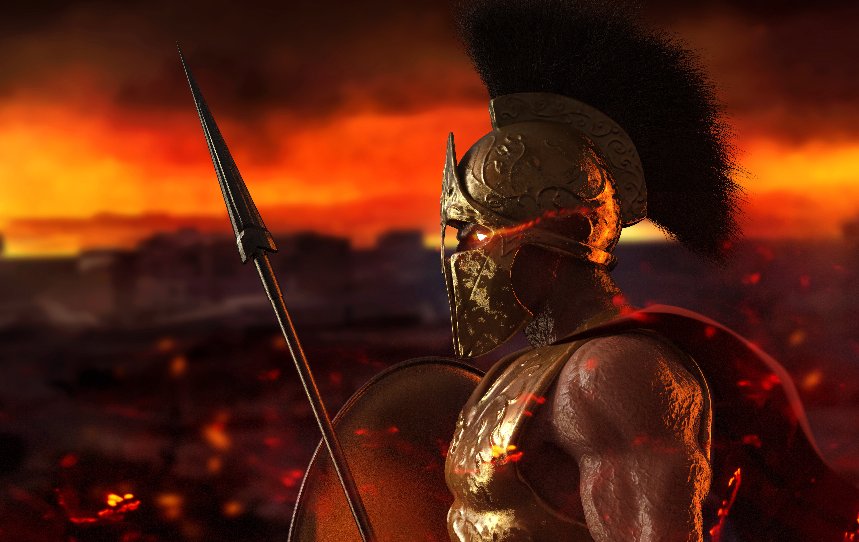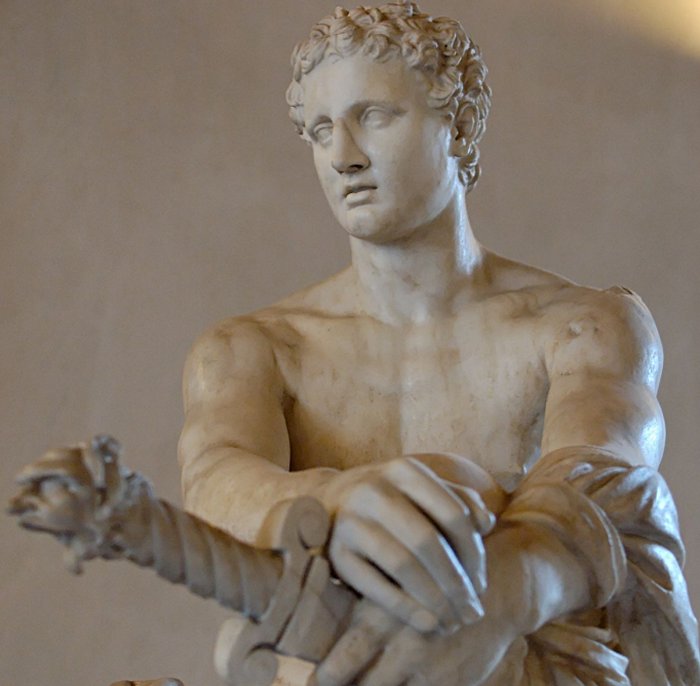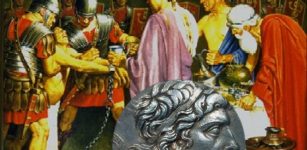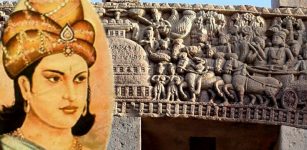War God Ares Was Brutal, Merciless And Disliked By Greeks But Popular In His Love Affairs
A. Sutherland - AncientPages.com - In Greek mythology, Ares was the god of war and violence but was not nearly as prominent in ancient Greece as his counterpart Mars was in ancient Rome.
He was also the spirit of battle, who never developed moral functions to stand as a good example.
 Ares – god of war, a symbol of violence, brutality, destruction, and man-slaughtering. Image credit: Credit: Adobe Stock - breakermaximus
Ares – god of war, a symbol of violence, brutality, destruction, and man-slaughtering. Image credit: Credit: Adobe Stock - breakermaximus
Ares loved war for its own sake; he symbolized tumult and chaos and was delighted to see the slaughter of men and the destruction of towns. He was not influenced by fighting but sometimes assisted one and sometimes the other in the battle. The name of Ares alone was a source of horror to the Greeks, though there was nothing hideous or disgusting in the appearance of the god who bore it. Ares stood for the war's wild and cruel nature and enjoyed the battle's tumult and bloodshed.
On the other hand, as the son of Zeus and Hera, the violent sides of Ares can be reflected in his parents' stormy relationship.
Ares was a beautiful and handsome god who never developed any moral functions, was impossible to restrain, and almost certainly was no good example to follow. Unlike his Roman counterpart, Mars, his worship was not extensive.
There are two known temples dedicated to him. One was located in Metropolis, a part of the Hellenistic kingdom of Pergamum, and during this period, the city flourished, reaching a zenith of cultural and economic life. Ares' worship was mainly focused on the northern areas of Greece. Being mighty warriors, the Spartans also held him in high regard.
In Iliad 5.846-909, we read that "war god Ares returns to Mount Olympus after being severely wounded on the Trojan battlefield by the Greek hero Diomedes, whose spear was guided by the warrior goddess Athena. Upon his arrival, Ares is greeted with harsh words from his very own father, Zeus, the king of the gods:
"To me, you are the most hateful of all the gods who hold Olympus. Forever quarreling is dear to your heart, wars, and battles." 1
 Ares God of war in Greek mythology. Source
Ares God of war in Greek mythology. Source
But this is the very meaning of the name Ares - the "Destroyer," isn't it?
Athena was the goddess of strategy instead of Ares's power, chaos, and destruction, who was not one of the most popular divinities of the Greek Pantheon. The Greeks, unlike the Romans, were not warlike people, and Ares was not one of their favorite and trusted gods.
Ares' origin was controversial, and his birthplace was considered Thrace, a country with a harsh climate and very warlike people (according to Homer). As he was never a popular Olympian divinity, his depictions are not very common in Greek art. Also, the myths and legends describing Ares are not particularly extensive regarding his person. Despite being hated and least respected by the Greek gods in the Pantheon, Ares could keep good relationships with women, who made him famous as he never used tricks and force toward them.
However, more positive features of his character have never been found in his personality.
Aphrodite And Ares As Secret Rival Of Hephaestus
On Olympus, Ares became the secret rival of the skilled Hephaestus, the lover of his legitimate wife, Aphrodite.
This love affair delivered 'some' embarrassment. When god was making love to the goddess, he was observed by Helios ("Sun") in Greek religion, who drove a chariot daily from east to west across the sky.
Helmeted young warrior, so-called Ares. Roman copy from a Greek original—this is a plaster replica, the original is now stored in the Museum of the Villa. Canope at the Villa Adriana in Tivoli. Image credit: Patrick Denker from Athens, GA - CC BY 2.0
Helios reported the event to Aphrodite's husband, Hephaestus, who prepared a unique, fragile but strong net, which he fixed on the lovers' bed, and then went on a journey to return at an unexpected moment for the lovers. He found them entangled in the net.
Hephaestus called all the gods, not just the goddesses. The situation between the lovers became embarrassing. As a result, Ares was to compensate Hephaestus for the insult he had suffered. On the other hand, Ares fled to Thrace after this affair, while Aphrodite traveled to Cyprus. Both of them did not appear among the gods for some time.
From the union of Ares with Aphrodite came into the world sons, Eros and Anteros, Phobos (God of phobias and fear), Deimos (God of terror), Harmonia (goddess of harmony), and Adrestia (goddess of revolt). Consequently, his frequent love affairs with mortal women fathered violent, disorderly sons and even skilled female warriors, Amazons.
The daughter of Ares was also Alkippe, later violated by Poseidon's son, Halirrhothius. Ares killed him, and for this killing, he stood before the tribunal of the twelve Olympic gods on the Athens hill (the Areopagus) that later became the site of Athens's future criminal trials. In this trial, Ares was acquitted by the court because his violent action against Halirrhothius was justified.
Wrong Contacts With Goddess Athena
In Greek literature, he symbolizes violence, brutality, destruction, and man-slaughtering, which undeniably contradicts her sister, Athena, a great goddess of wisdom, warfare, and intelligence who has aided the heroes like Perseus, Heracles, Bellerophon, and Jason.
The goddess Athena hated Ares. One day, she skillfully turned the spear of the Achaean hero Diomedes against Ares. The weapon found an unarmored spot and pierced Ares ' stomach. With a wild howl, Ares left the battlefield and flew to Olympus with a complaint about Athena.
Zeus did not even want to listen to his' explanation. Ares was punished fairly and deserved to be not on Olympus but in Tartarus.
Written by – A. Sutherland - AncientPages.com Senior Staff Writer
Updated on February 10, 2024
Copyright © AncientPages.com All rights reserved. This material may not be published, broadcast, rewritten or redistributed in whole or part without the express written permission of AncientPages.com
Expand for referencesMore From Ancient Pages
-
 Early Humans In Europe Were Making Fires At Least 250,000 Years Ago – New Study
Archaeology | May 18, 2023
Early Humans In Europe Were Making Fires At Least 250,000 Years Ago – New Study
Archaeology | May 18, 2023 -
 Florida’s Ancient Underwater Burial Site Much Older Than Previously Thought
Archaeology | Jun 24, 2019
Florida’s Ancient Underwater Burial Site Much Older Than Previously Thought
Archaeology | Jun 24, 2019 -
 2,000-Year-Old Celtic Dice Discovered In Poland
Archaeology | Oct 11, 2023
2,000-Year-Old Celtic Dice Discovered In Poland
Archaeology | Oct 11, 2023 -
 Thousands Magnificent Jade Artifacts Discovered In Han Dynasty Tombs – China’s Golden Age In New Light
Archaeology | Jul 23, 2020
Thousands Magnificent Jade Artifacts Discovered In Han Dynasty Tombs – China’s Golden Age In New Light
Archaeology | Jul 23, 2020 -
 King Mithradates VI Of Pontus Used Poison To Avoid Death By Poison
Ancient History Facts | Mar 5, 2016
King Mithradates VI Of Pontus Used Poison To Avoid Death By Poison
Ancient History Facts | Mar 5, 2016 -
 On This Day In History: Gerardus Mercator Famous Mapmaker Of All Time Died – On Dec 2, 1594
News | Dec 2, 2016
On This Day In History: Gerardus Mercator Famous Mapmaker Of All Time Died – On Dec 2, 1594
News | Dec 2, 2016 -
 Stone Age People Used Human Bones For Making Pendants
Archaeology | Jul 6, 2022
Stone Age People Used Human Bones For Making Pendants
Archaeology | Jul 6, 2022 -
 Huge Unknown Ancient Lost World Discovered Inside Giant Sinkhole In China
News | May 19, 2022
Huge Unknown Ancient Lost World Discovered Inside Giant Sinkhole In China
News | May 19, 2022 -
 Three 17th Century Shipwrecks Discovered In Central Gothenburg, Sweden
Archaeology | Oct 8, 2019
Three 17th Century Shipwrecks Discovered In Central Gothenburg, Sweden
Archaeology | Oct 8, 2019 -
 How Great Emperor Ashoka Realized And Showed All Living Beings Matter
Featured Stories | Mar 4, 2021
How Great Emperor Ashoka Realized And Showed All Living Beings Matter
Featured Stories | Mar 4, 2021 -
 Why Did Winter Baths Become So Popular?
Ancient History Facts | Jan 16, 2024
Why Did Winter Baths Become So Popular?
Ancient History Facts | Jan 16, 2024 -
 New Guineans And Aboriginal Australians Descend From Two Groups Who Arrived On The Supercontinent Sahul 60,000 Years Ago
Archaeology | Dec 30, 2025
New Guineans And Aboriginal Australians Descend From Two Groups Who Arrived On The Supercontinent Sahul 60,000 Years Ago
Archaeology | Dec 30, 2025 -
 600-Year-Old Axe Heads Used In The Battle Of Grunwald Found in Poland
Archaeology | Sep 1, 2020
600-Year-Old Axe Heads Used In The Battle Of Grunwald Found in Poland
Archaeology | Sep 1, 2020 -
 Agriculture In North America Led To Changes In Age-Independent Mortality
Archaeology | Jan 24, 2023
Agriculture In North America Led To Changes In Age-Independent Mortality
Archaeology | Jan 24, 2023 -
 DNA From Doggerland That Separates The UK From Europe – New Study
Archaeology | Jul 20, 2020
DNA From Doggerland That Separates The UK From Europe – New Study
Archaeology | Jul 20, 2020 -
 Reconstructed Roman Gateway Tells The Story Of Britain’s Invasion
Featured Stories | Aug 26, 2023
Reconstructed Roman Gateway Tells The Story Of Britain’s Invasion
Featured Stories | Aug 26, 2023 -
 Unknown Inscription Accidentally Found In South Tower Of 13th Century Cēsis Castle In Latvia
Archaeology | Aug 18, 2020
Unknown Inscription Accidentally Found In South Tower Of 13th Century Cēsis Castle In Latvia
Archaeology | Aug 18, 2020 -
 Unexplained Encounters With A Mysterious Being In South Dakota Reported – Why Is This Happening?
Featured Stories | Jul 9, 2024
Unexplained Encounters With A Mysterious Being In South Dakota Reported – Why Is This Happening?
Featured Stories | Jul 9, 2024 -
 Never-Before-Seen Object Found In The Skull Of Powerful Ancient Ruler Raises Many Questions
Featured Stories | Nov 12, 2024
Never-Before-Seen Object Found In The Skull Of Powerful Ancient Ruler Raises Many Questions
Featured Stories | Nov 12, 2024 -
 Pulque: Ancient Drink Of The Gods Is Popular Again But It Has Odd Side-Effects
Ancient Traditions And Customs | Jun 29, 2017
Pulque: Ancient Drink Of The Gods Is Popular Again But It Has Odd Side-Effects
Ancient Traditions And Customs | Jun 29, 2017

